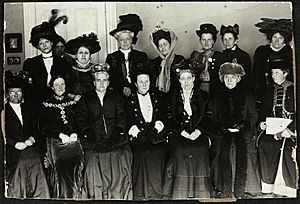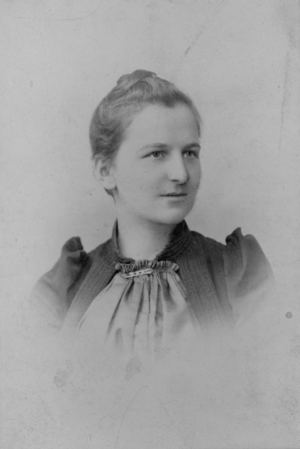Käthe Schirmacher facts for kids

Käthe Schirmacher was a German writer, journalist, and political activist. Born in Danzig on August 6, 1865, she was seen as a key leader in the women's rights movement during the 1890s. She worked to improve life for women both in Germany and around the world. She passed away in Meran on November 18, 1930.
Contents
Käthe Schirmacher's Life Story
Käthe Schirmacher grew up as the daughter of a rich merchant. However, her family lost their money in the 1870s when she was still young. Despite this, Käthe became one of the first women in Germany to earn a doctorate degree. She studied at the Sorbonne in Paris. From 1893 to 1895, she continued her studies in Germany. She earned her doctorate in Romance studies (the study of languages like French, Spanish, and Italian) in Zürich under Heinrich Morf.
Working for Women's Rights
In 1899, Käthe Schirmacher helped start the Bund Deutscher Frauenvereine (Federation of German Women's Associations) in Berlin. In 1904, she also became involved with the International Alliance of Women. This group worked for women's rights around the world.
During the late 1890s and early 1900s, Schirmacher traveled a lot. She visited many places in Europe and the United States. She gave talks about German culture and important issues for women.
Defining the Modern Woman
One of Käthe Schirmacher's main ideas was about the "modern woman." She wrote and lectured about what a modern woman should be like. Her ideas were explained in her book, Die moderne Frauenbewegung (The Modern Woman's Rights Movement), published in 1909.
She believed in four main points for women:
- Equal Education: Women should have the same chances as men to get an education and learn new things.
- Freedom in Work: Women should be free to choose any job they want. They should also be paid the same as men for the same work.
- Full Legal Rights: Women should have full legal standing and rights under the law.
- Recognizing Women's Value: Society should value the work women do, whether it's at home or in a professional job.
These ideas were quite advanced for her time.
Changes in Her Views
Around 1904, Käthe Schirmacher's political ideas began to change. She started to support more extreme nationalist views. This meant she believed strongly in her own nation's interests above all else. She began to distance herself from the left-leaning groups she had helped create and lead. By 1913, as the possibility of war grew and strong nationalist feelings spread across Europe, Schirmacher completely broke ties with the women's organizations she had been part of.
During and After World War I
When World War I began, Schirmacher became involved in writing and publishing German propaganda. These were mostly pamphlets that were shared across Germany and France. They aimed to influence public opinion during the war.
After the war ended, she joined the right-wing German National People's Party (DNVP). She shared their nationalist beliefs and continued to be active in politics.
Published Works
Käthe Schirmacher wrote many books and articles. Here are some of her important works:
- The Libertad. Novella Publishing House Magazine, Zurich, 1891.
- The International Women's Conference in Chicago 1893. This was a lecture she gave about a meeting where important women's rights leaders gathered.
- Le Féminisme Aux États-Unis, En France, Dans La Grande-Bretagne, En Suède Et En Russie: Questions Du Temps Présent (1898)
- Die Frauenbewegung, "The Women's Movement, Their Causes and Means" (1902)
- Die moderne Frauenbewegung (The Modern Woman's Rights Movement, 1909)
- Die Suffragettes (1912)
See also
 In Spanish: Käthe Schirmacher para niños
In Spanish: Käthe Schirmacher para niños
 | Mary Eliza Mahoney |
 | Susie King Taylor |
 | Ida Gray |
 | Eliza Ann Grier |


